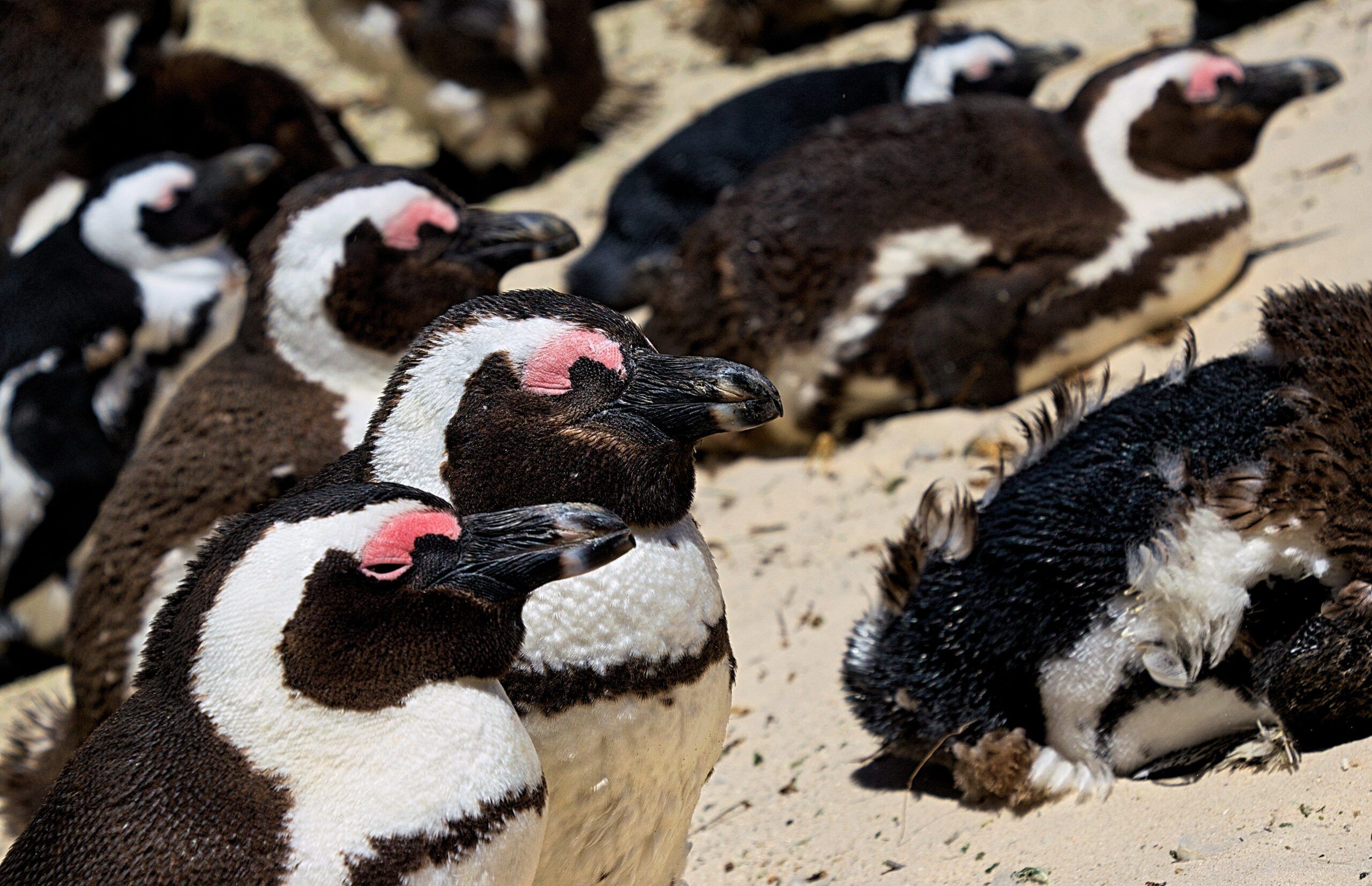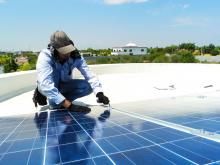Of Penguins & Solar Panels

Here’s a surprising penguin fact: much like our own communities, African Penguins and the ecosystems they’re part of benefit from our transition away from fossil fuels and toward renewable energy.
Like many people, we at the New England Aquarium believe in safeguarding people and places from harm, for the well-being of both animals and people. Our use of fossil fuels – like coal, oil, and natural gas – for energy releases excess carbon dioxide into the atmosphere. In the atmosphere, carbon dioxide acts like a heat-trapping blanket, preventing Earth’s heat from escaping, which warms the planet, including the ocean.
Many marine animals thrive in very specific temperature ranges and, as the ocean warms, they are moving toward the poles or to deeper waters, disrupting the food chain. Penguins, like the ones you see at the Aquarium, are finding that their food sources are shifting.

The key to protecting our planet is reducing our fossil fuel consumption at a community level. Fortunately for us, we have initiatives like Solarize Massachusetts, a program that increases the adoption of small-scale solar electricity by encouraging communities to join together to lower purchase prices.
58 communities have already joined this effort, and we encourage our visitors to share what they have learned with their town and get them involved. Switching to renewable energy helps us, helps penguins, and helps the ocean!
More Blog Posts
 The Science of ExtremesThe Science of Extremes by Richelle Tanner, July 13 2021 Extreme is a word that can send a climate communicator directly into the swamp: the word extreme is inherently a bit alarming, and vague enough to warrant a multi-sentence qualification when you use it. Even scientists disagree on what this word means and in which context it is appropriate. [READ MORE]
The Science of ExtremesThe Science of Extremes by Richelle Tanner, July 13 2021 Extreme is a word that can send a climate communicator directly into the swamp: the word extreme is inherently a bit alarming, and vague enough to warrant a multi-sentence qualification when you use it. Even scientists disagree on what this word means and in which context it is appropriate. [READ MORE] Angling Toward Solutions in Climate Change EducationAngling Toward Solutions in Climate Change Education John Anderson, September 21 2016 Our global community is confronting a significant opportunity to change. We understand that protecting what matters to our families: our health and security, special places we care about, and living creatures with whom we share this planet (people and non-human [READ MORE]
Angling Toward Solutions in Climate Change EducationAngling Toward Solutions in Climate Change Education John Anderson, September 21 2016 Our global community is confronting a significant opportunity to change. We understand that protecting what matters to our families: our health and security, special places we care about, and living creatures with whom we share this planet (people and non-human [READ MORE] Friendly neighborhood climate scientistFriendly neighborhood climate scientist by Jeremy Owens, March 23 2020 Have you ever wanted or even needed a climate science question answered but couldn’t find an answer and you wanted to speak with a scientist? Have you wanted to work with a scientist to do outreach but didn’t know how to contact someone? If you have ever had a need but felt [READ MORE]
Friendly neighborhood climate scientistFriendly neighborhood climate scientist by Jeremy Owens, March 23 2020 Have you ever wanted or even needed a climate science question answered but couldn’t find an answer and you wanted to speak with a scientist? Have you wanted to work with a scientist to do outreach but didn’t know how to contact someone? If you have ever had a need but felt [READ MORE] Correcting the ‘Non-Debate’ Debate about Framing Climate ChangeCorrecting the ‘Non-Debate’ Debate about Framing Climate Change by Julie Sweetland, June 02 2016 Most people are familiar with the “non-debate” debate between the overwhelming majority of scientists who conclude that fossil fuels are contributing to disruptions to the climate system and the tiny but vocal few who deny it. Now, another “non-debate” [READ MORE]
Correcting the ‘Non-Debate’ Debate about Framing Climate ChangeCorrecting the ‘Non-Debate’ Debate about Framing Climate Change by Julie Sweetland, June 02 2016 Most people are familiar with the “non-debate” debate between the overwhelming majority of scientists who conclude that fossil fuels are contributing to disruptions to the climate system and the tiny but vocal few who deny it. Now, another “non-debate” [READ MORE] Global Climate Action Summit RecapGlobal Climate Action Summit Recap by Allison Arteaga, September 20 2018 One week ago, leaders from around the world gathered in San Francisco for the Global Climate Action Summit. The event celebrated ongoing efforts to curb fossil fuel emissions, while also calling for more ambitious action to meet the targets set forth by the Paris Agreement. [READ MORE]
Global Climate Action Summit RecapGlobal Climate Action Summit Recap by Allison Arteaga, September 20 2018 One week ago, leaders from around the world gathered in San Francisco for the Global Climate Action Summit. The event celebrated ongoing efforts to curb fossil fuel emissions, while also calling for more ambitious action to meet the targets set forth by the Paris Agreement. [READ MORE]